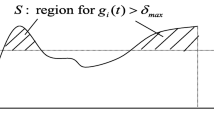Abstract
With the development of modern power system, real-time simulation and on-line control are becoming more and more critical. Transient stability analysis, where the most intensive computation locates, is the bottleneck of real-time simulation for large-scale power system. Thus, the key to achieve the real-time simulation of large scale power systems is to find the new transient stability algorithms and parallel software with high-performance computers. This paper presents a new spatial parallel transient stability algorithm including an improved parallel network algorithm and an optimal convergence checking method. The simulation software with the spatial parallel algorithm is designed and implemented on a SMP-cluster system. The test cases of national power grid of China show that the optimal computation time of the parallel software is only 38% of the actual dynamic process. It is suggested that the algorithms described in this paper can achieve the super real-time simulation of very large scale power system and make the complex on-line power applications, especially on-line supervision and control for large scale power system, feasible.
Access this chapter
Tax calculation will be finalised at checkout
Purchases are for personal use only
Preview
Unable to display preview. Download preview PDF.
Similar content being viewed by others
References
Stott, B.: Power System Dynamic Response Calculations. IEEE Proc. 67(2), 219–241 (1979)
Alvarado, F.L.: Computational Complexity in Power Systems. IEEE Trans. On PAS PAS-95(4), 1028–1036 (1976)
Xue, W., Shu, J.W., Wang, X.F., Zheng, W.M.: Advance of parallel algorithm for power system transient stability simulation. Journal of system simulation 14(2), 177–182 (2002) (in Chinese)
Li, Y.L., Zhou, X.X., Wu, Z.X.: Parallel algorithms for transient stability simulation on PC cluster. In: PowerCon 2002, vol. 3, pp. 1592–1596 (2002)
Chan, K.W., Dunn, R.W., Daniels, A.R.: Efficient heuristic partitioning algorithm for parallel processing of large power systems network equations. IEE Proc.-Gener. Transm. Distrib. 142(6), 625–630 (1995)
Jiwu, S., Wei, X., Weimin, Z.: An Optimal Partition Scheme of Transient Stable Parallel Computing in Power System. Automation of Electric Power Systems 27(19), 6–10 (2003) (in Chinese)
Tylavsky, D.J., Bose, A.: Parallel processing in power systems computation. IEEE Trans. On PWRS 7(2), 629–638 (1992)
Chai, J.S., Bose, A.J.: Bottlenecks in Parallel Algorithms for Power System Stability Analysis. IEEE Trans. On PWRS 8(1), 9–15 (1993)
Falcao, D.M.: High Performance Computing in Power System Applications. In: Proc. 2nd International Meeting on Vector and Parallel Processing, Porto, Portugal, pp. 1–23 (1996)
Xiaoyan, H., Zhenxiang, H.: The Research on Inherent Parallel Algorithm for Power System Transient Stability Analysis. Proceedings of CSEE 17(3), 145–148 (1997) (in Chinese)
Fangzong, W.: Parallel algorithm of highly parallel relaxed Newton method for real-time simulation of transient stability. Proceedings of CSEE 19(11), 14–17 (1999) (in Chinese)
Torralba, A.: Three methods for the parallel solution of a large, sparse system of linear equations by multiprocessors. International journal of energy systems 12(1), 1–5 (1992)
Decker, I.C., Falcao, D.M.: Conjugate gradient methods for power system dynamic simulation on parallel computers. IEEE Trans. On PWRS 11(3), 1218–1227 (1996)
Nagata, M., Uchida, N.: Parallel processing of network calculations in order to speed up transient stability analysis. Electrical Engineering in Japan 135(3), 26–36 (2001)
Author information
Authors and Affiliations
Editor information
Editors and Affiliations
Rights and permissions
Copyright information
© 2004 Springer-Verlag Berlin Heidelberg
About this paper
Cite this paper
Xue, W., Shu, J., Zheng, W. (2004). Parallel Transient Stability Simulation for National Power Grid of China. In: Cao, J., Yang, L.T., Guo, M., Lau, F. (eds) Parallel and Distributed Processing and Applications. ISPA 2004. Lecture Notes in Computer Science, vol 3358. Springer, Berlin, Heidelberg. https://doi.org/10.1007/978-3-540-30566-8_89
Download citation
DOI: https://doi.org/10.1007/978-3-540-30566-8_89
Publisher Name: Springer, Berlin, Heidelberg
Print ISBN: 978-3-540-24128-7
Online ISBN: 978-3-540-30566-8
eBook Packages: Computer ScienceComputer Science (R0)



